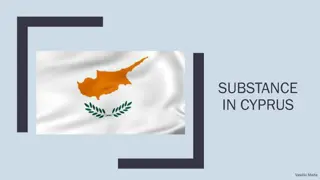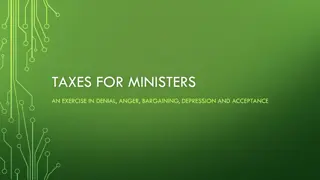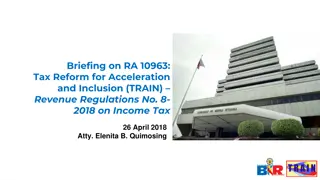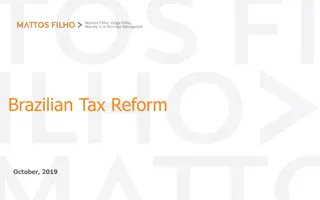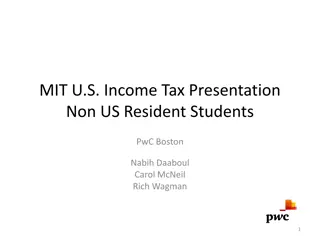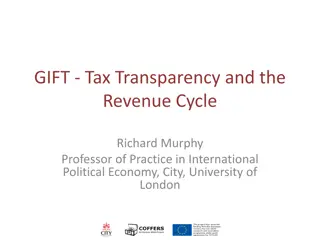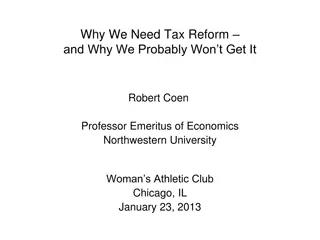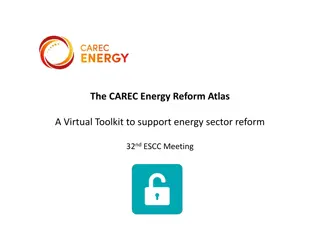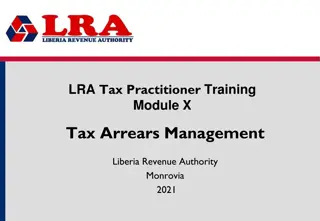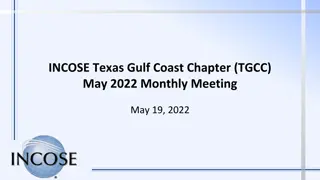Green Tax Reform Proposal Symposium: July 5, 2022
This symposium presentation explores the need for a green tax reform, emphasizing the impact of carbon pricing on households and key sectors. It delves into the context and legal background, outlines objectives and methodology, and makes a case for fiscal reform in Belgium. The study aims to identify avenues for reforming the federal fiscal system to address climate change and environmental protection, taking into account the EU legal framework and Belgian institutional context.
Download Presentation

Please find below an Image/Link to download the presentation.
The content on the website is provided AS IS for your information and personal use only. It may not be sold, licensed, or shared on other websites without obtaining consent from the author.If you encounter any issues during the download, it is possible that the publisher has removed the file from their server.
You are allowed to download the files provided on this website for personal or commercial use, subject to the condition that they are used lawfully. All files are the property of their respective owners.
The content on the website is provided AS IS for your information and personal use only. It may not be sold, licensed, or shared on other websites without obtaining consent from the author.
E N D
Presentation Transcript
PROPOSAL FOR A GREEN TAX REFORM Symposium Tax Reform July 5, 2022
Structure presentation Context & legal background (Fanny Vanrykel) Impact of carbon pricing on household level (Audric De Bevere) Impact of carbon pricing and other measures in key sectors (Rosanne Vanpee) Recommendations (Fanny Vanrykel) Symposium tax reform - green tax reform 2
CONTEXT & LEGAL BACKGROUND Fanny Vanrykel Universit Saint-Louis Bruxelles Symposium tax reform - green tax reform 3
Objectives and methodology of the study Identify possible avenues for reforming the federal fiscal system to enable climate change mitigation and environmental protection Energy taxation Other fiscal measures Taking into account EU legal & policy framework (including Fit for 55) Belgian institutional context Situation in neighbouring countries Methodology: multidisciplinary approach Micro- and macroeconomic analyses Study of the (EU) legal framework Benchmark against other (mainly EU) countries Interviews with experts
The case for a fiscal reform Current energy taxes in Belgium do not reflect environmental cost Need for reform! 50.0% 45.8% 45.0% 40.0% 33.3% 35.0% 30.0% 25.0% 20.0% 16.7% 15.0% 10.0% 4.2% 5.0% 0.0% 0.0% 0.0% Much too low Somewhat too low Adequate Somewhat too high Much too high No answer Figure 2.1: Expert opinion on adequacy of current environmental taxation in Belgium (n=24) Symposium tax reform - green tax reform 5
Current excise taxes on heating fuels versus environmental cost in EUR/GJ Symposium tax reform - green tax reform 6
Current excise taxes on motor fuels versus external cost in EUR/GJ Symposium tax reform - green tax reform 7
EU Legal context of energy & CO2 taxation Current context Legally binding but with varying degrees of discretion Energy taxation partially harmonised (ETD 2003/96) EU-ETS in industrial sector & partly aviation A changing context EU Green Deal European climate law Net zero by 2050; Net 55% GHG emission reduction by 2030 Fit for 55 package Revision of the ETD Minimum rates: environmental performance & calorific content Removal of fossil fuels subsidies Revision of the EU-ETS Expansion to the maritime sector ETS II in transport and buildings Social climate fund Symposium tax reform - green tax reform 8
Scenario for reforming federal energy taxes Two-part scenario for energy tax reform: Part 1: Implement revision of the ETD assuming it is adopted Part 2: Adoption of a carbon tax to energy used in non-ETS sectors Justified apply Carbon price of 20/tCO2in the short run (2023) Carbon price of 70/tCO2in the medium run (2030) Budget neutral tax shift (with revenue redistribution) Results are valid regardless of the type of pricing instrument used (tax or ETS) insofar as EU-ETS does not Symposium tax reform - green tax reform 9
IMPACT AT THE HOUSEHOLD LEVEL Grandjean Gilles & De Bevere Audric Universit Saint-Louis Bruxelles Symposium tax reform - green tax reform 10
Impact at the household level Methodology Microeconomic simulation Based on the 2018 Household Budget Survey (HBS) 6,000 households (HH) reported their monthly expenditures Microeconomic simulation 2023 ETD revision 20 /ton of CO2carbon tax on fuel expenditures (heating and transport) Redistribution of tax paid by HH to them Symposium tax reform - green tax reform 11
Hypotheses 2018 energy quantities No behavioral adaptation Symposium tax reform - green tax reform 12
Reference scenario: Equal redistribution The carbon price adds respectively 8 and 4 to heating and transport fuels expenditures Heating fuels expenditures are relatively flat Deciles 1 to 4 are net winners of the reform Symposium tax reform - green tax reform 13
Intra-deciles disparities Considerable heterogeneity between HH within the same decile Heavily impacted lose 10/month on average; Slightly impacted gain 10/month on average Symposium tax reform - green tax reform 14
Socio-demographic characteristics Avg Impact ( /month) -9.9 1.5 8.3 -1.9 4.5 -4.2 0.2 5 Variable Heating Oil Heating Gas Heating Other House Apartment 2 cars or more One car No car Winners Big Losers[1] 14 % 65 % 94 % 49 % 80 % 40 % 58 % 84 % 6.5 % 0.6 % 0 % 2.4 % 0.8 % 1.3 % 2.3 % 1.6 % Total population 0 58 % 1.9 % [1] HH who lose more than 1% of their total income after reform Symposium tax reform - green tax reform 15
Targeted revenue-recycling Why targeting low-income HH? To tackle (energy) poverty To foster political acceptability Symposium tax reform - green tax reform 16
Alternative revenue-recycling (1): Energy_Poor (2): first 3 deciles (3): Total pop. Avg. Impact (1) (2) Big Losers (1) (2) Winners (1) (2) (3) Reference scenario -3.5 1.7 10 % 4.3 % 41 % 67 % 58 % Lump sum X2 20% -0.3 6.1 8.5 % 2.9 % 57 % 78 % 56 % Lump sum degressive 1.9 7.4 5.7 % 1.7 % 62 % 82 % 55 % 6% VAT Electricity -3.5 0.8 12 % 6% 35 % 57 % 54 % Lump sum degressive: the poorer you are, the higher the compensation Symposium tax reform - green tax reform 17
Impact at the household level Aggregated results (//Macro) Relative price increase +4% for transport fuels +11% for heating fuels Tax revenue from households Both reforms would bring in a total of 700M 70% from it is collected on heating fuels Symposium tax reform - green tax reform 18
IMPACT OF CARBON PRICING AND REFORMS IN KEY SECTORS Rosanne Vanp e Transport & Mobility Leuven Symposium tax reform - green tax reform 19
Impact energy tax reform on CO2- emissions and tax revenues Reference year 2023 Reference year 2030 20 /tCO2 248 70 /tCO2 625 100 /tCO2 830 Carbon tax collected from firms Carbon tax collected from households 614 1312 1742 Total carbon tax 862 1937 2572 Impact revision of ETD rates on firm 95 52 49 Impact revision of ETD rates on households 149 82 79 Total ETD 244 134 128 Total impact on revenues 1106 2071 2700 Symposium tax reform - green tax reform 20
Recycling of tax revenues Symposium tax reform - green tax reform 21
Additional measures Key area Industry & Agriculture (case 1) Priority measure Increased taxes on fertilizer and pesticides Meat tax Tax on rents made by electricity producers Phase out reimbursement of excise duty on commercial diesel Excise tax on LPG and CNG Increased airplane ticket tax Phase out company car and fuel card subsidies Institutionalise bicycle commuting allowance Reform of beverage container tax Type Indirect tax (VAT) Indirect tax (VAT) Direct tax (economic rents) Indirect tax (excise duty) Indirect tax (excise duty) Indirect tax (flat rate) Removal of direct tax credit Direct tax credit Indirect tax (excise duty) Transport (case 2) Circular economy (case 3) Introduce a plastic packaging tax with differentiation based on recyclability Modify the investment deductions to counter rapid depreciation of equipment Temporary tax incentive for green bonds Indirect tax Investment deduction regulations Direct tax credit or subsidy Reform of existing direct tax credit Financial sector (case 4) Buildings (case 5) Green tax credit for pension funds and long-term savings Fiscal incentive for collective financing mechanisms Direct tax credit Based on: Best practices/lessons learned from neighbouring countries Literature study Expert interviews Symposium tax reform - green tax reform 22
Phase out reimbursement of excise duty on commercial diesel Symposium tax reform - green tax reform 23
Phase out reimbursement of excise duty on commercial diesel Proposed reform: Phase out the excise duty reform on commercial diesel (Scenario A). Second best option: adjust the level of the excise tax to the level applied in France, at the latest on 1-01-2023 (Scenario B). Scenario A -20.7% -3.9% 366 m +35% Scenario B -10.7% -2.3% 151 m +14.5% Demand effect Excl. fuel tourism Budgetary impact Budgetary impact % Symposium tax reform - green tax reform 24
Green tax credit for pension funds and long-term savings Proposed reform: Tax credit pension funds and long-term savings conditional on the environmental investment strategy of the fund/savings How? Use EU Taxonomy to define green investments Align with the Sustainable Finance Disclosure Regulation No meaningful budgetary impact (Indirect) environmental impact: asset managers can leverage the transition towards a green economy (Schoenmaker, 2017) Symposium tax reform - green tax reform 25
POLICY RECOMMENDATIONS Fanny Vanrykel Universit Saint-Louis Bruxelles Symposium tax reform - green tax reform 26
Policy recommendations Implement a federal carbon tax in sectors not covered by the (revised) EU-ETS o Necessary but insufficient o Increasing carbon price trajectory o Communicated well in advance o Urgency long term investments o Energy prices will not deliver sufficient change Compensate (low-income) households o Redistribution at the household level o Direct income transfers rather than price reduction o Different transfers to different groups based on income o Consider rural targeted transfers Broader context o Introduce element of resilience (cliquet) to address energy prices increases o Complementarity with other (EU/federal/regional) measures Consider adopting new environmental taxes/tax incentives in the five key sectors as suggested Symposium tax reform - green tax reform 27
THANK YOU Symposium tax reform - green tax reform 28



![Town of [Town Name] Real Estate Tax Rates and FY 2024 Budget Summary](/thumb/62211/town-of-town-name-real-estate-tax-rates-and-fy-2024-budget-summary.jpg)


